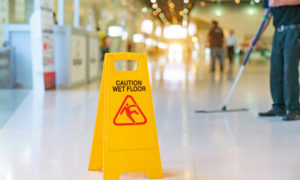A How-To Guide for Obtaining Workers’ Comp

Workers’ compensation insurance covers accidental injuries and occupational diseases that arise within the scope of employment. Workers’ comp also covers injuries resulting in death that takes place within a specified period after a workplace injury. Landscape gardeners, farm machinery operators, oil or gas contractors, manufactured, modular, or prefab building contractors, welders, machinery and equipment operators, and masonry contractors are some of the many trades that require workers comp.
Employers Must Provide Workers’ Comp
When business owners provide their employees with workers’ comp insurance, the worker and the employer are protected. Workers’ comp requirements apply to construction owners, partners, sole proprietors, and corporate officers, but certain company officers may file for an exemption. The following employers must provide workers compensation:
- Construction employers with more than one employee
- Non-construction employers with four or more employees
- Agriculture employers with 12 seasonal employees who are working more than 30 days during the season but not more than a total of 45 days during the calendar year
- Agricultural employers with six regular employees
Subcontractors Need Workers’ Comp Insurance
Subcontractors are responsible for providing workers’ compensation insurance for themselves and their workers to cover any work-related accident, injury, illness, or fatality. However, it is essential to note that the primary contractor overseeing the site is responsible for ensuring that subcontractors have active coverage for their workers. If a subcontractor who is not covered by workers’ comp is injured, the general contractor is responsible for paying the benefits.
If the company has a workers’ comp policy and subs out work to a subcontractor with a workers’ comp exemption, the subcontractor must have coverage for any employees or relatives they bring to the job site. If the subcontractor doesn’t show proof of workers’ comp coverage for their workers, the general contractor should pay the workers’ comp premium on wages paid to the sub’s helpers or the company will be held liable if there is an injury.
Out-of-State Employees and Workers’ Comp
Employers are required to provide workers’ comp insurance on out-of-state employees. For example, independent contractors and out-of-state employers engaging in construction work within Florida must immediately contact their insurance company or an insurance agent to address working within Florida. If an employee is injured on the job and workers’ comp was not active, contact a construction accident lawyer to discuss the case.
Out-of-state business owners must contact a state-licensed insurance company for more information on how to obtain a workers’ comp policy.
Proof of Workers’ Comp or Proof of Exemption
In some cases, construction business owners may obtain an exemption from workers’ compensation insurance. Individuals who own 10% of the corporation or a limited liability company may be eligible for an exemption. Non-owner employees are not eligible.
An exemption excludes the business owner from purchasing workers’ comp insurance for themselves, but they cannot receive workers’ comp benefits if injured on the job. Everyone working on a construction site must have proof of exemption or worker’s comp coverage, and this includes individuals brought to the job site to help for a short term.
When the owner of a company has a personal exemption, they are still required to have a workers’ comp policy covering one or more employees. Contractors can inquire about workers’ comp insurance or apply for an exemption at the Division of Workers’ Compensation website. The exemption costs $50 and must be renewed every two years.
Reporting a Claim
It is important to report an injury or illness to the insurance carrier within seven days of first becoming aware of an incident. It is also a good idea to contact a legal expert to have the case reviewed.
What if the Injured Employee Failed to Follow Safety Regulations?
Workers’ compensation is available to injured employees who failed to wear safety appliances like goggles or a hardhat and to workers who refused to follow safety regulations. However, the insurance company may reduce the compensation by 25% if they determine that the employee knew about the safety rule, failed to observe the law before the accident, or knowingly chose not to use the safety appliance as directed by their employer.
What if an Employee’s Injury Claim is False?
If a business owner suspects a worker is faking an injury claim, the employer should make sure to file the claim and discuss the situation with the insurance carrier. Contacting a workers’ comp lawyer for a free consultation is recommended if a business owner suspects employee fraud.
Hiring a Construction Accident Attorney
If the injured employee is entitled to workers’ compensation, they will be paid a percentage of their wages and have health insurance coverage for medical procedures. If the company has been operating without insurance or if the claim is deemed fraudulent, penalties may be imposed on business owners. Contact a legal professional for more information about workers’ comp and other construction law matters.




















